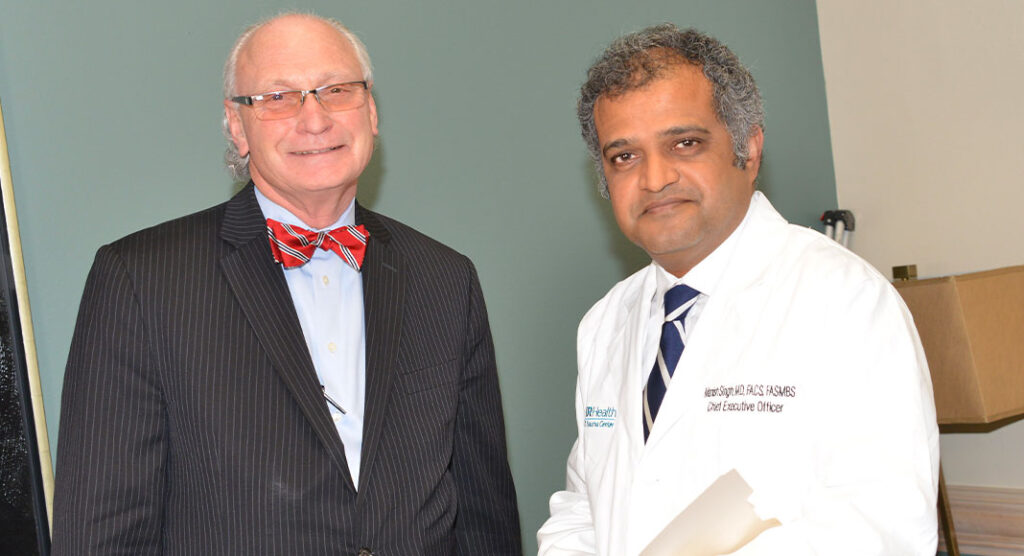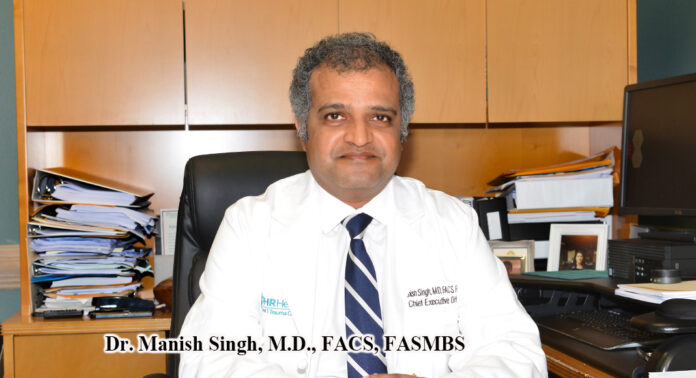Mega Doctor News
By Roberto Hugo Gonzalez
Dr. Manish Singh is board certified in Advanced Laparoscopic and Bariatric Surgery. He was trained in weight loss surgery at the Cleveland Clinic Bariatric & Metabolic Institute in Cleveland, Ohio. When I first met him, he had been with DHR Health for seven months and was very busy serving as the Medical Director at the DHR Health Bariatric & Metabolic Institute.
Since he arrived here ten years ago, he and his family have enjoyed the semitropical weather of South Texas but, above all, the warm and welcoming smiles of the Valley residents.
Today, he is even busier because in January 2019, Dr. Singh became the Chief Executive Officer of DHR Health. “I’m also practicing advanced laparoscopic and bariatric surgery. I’m part of the Bariatric & Metabolic Institute at DHR Health,” he said.
He remembers doing his first surgery in the Valley on January 31, 2012. You might ask, but what brought him to South Texas? He said that he had never heard much about Texas, so the story of how he got here is interesting.
“When I was up north, I did most of my training in Cleveland, Ohio and I lived in Baltimore, Maryland. I had been to Dallas for one of my board exams. That was the farthest south I had traveled,” he explained.
When he was looking for a job, he concentrated primarily on the northeast of the United States, especially in the Cleveland Clinic, where he received his training.
One day, one of his mentors shared with him that they had a bright surgery resident by the name of Victor Haddad some thirty years ago. Dr. Haddad had visited the residency program where Dr. Singh was receiving training and left some informational DVDs about south Texas and DHR Health. Dr. Singh’s mentor told him that Dr. Haddad had left a message that all residents should visit South Texas because it was about the future.
“It was March, there were six feet of snow outside, so I called Dr. Haddad and arranged to visit.” He said, “So I came to the Valley, and I loved it. I fell in love with the place, the weather, and the people.”
He told Mega Doctor News that he feels lucky to this day because he would not have been able to achieve what he has done in the last ten years. “It was a great opportunity; there is no place where you can achieve what I have,” he said.
Dr. Singh also witnessed the fusion of two universities and the birth of the new one. He also saw the creation and the beginning of a medical school, which, as he says, is unprecedented. He has been involved in teaching the new residents of the UTRGV School of Medicine when they come in for rotation. “It is an exceptional experience.”
He said that his experience as the Chief Executive Officer for the last two years has been unforgettable, especially when the pandemic hit the South Texas communities. “No one was prepared for such a calamity.” He said, “We confronted the situation head on. With the DHR Health team, we were able to stabilize the ship (hospital) and most important, we were able to take care of the community.”
He added, “Looking back, yes, it was tough. Sometimes I wanted to throw in the towel, but I’m glad I didn’t. Also, I’m glad I had the opportunity to serve the people of this community, and that’s priceless.”
Do you think that all of this is behind us? “It is behind us in the way that it will not impact the community again as it did.” He said, “When people were getting sick of Covid-19, there was no vaccine, and no one knew how to treat it. Plus, it was more widespread; it was a pandemic.” He pointed out that the disease will be here as we move forward, but it’ll be like any other disease to manage.

Family Roots
Dr. Singh was born in Begusarai town in the Bihar State of India. He is a member of a proud family; most of them are engineers. His father, Naresh Prasad Singh was an engineer in the army; it moved him all over the country every four years. Dr. Singh has a brother Navin Singh, an environmental engineer; he has his own consulting firm in India. It doesn’t stop there, his uncle and sister-in-law are engineers, and his nephews are now engineers. Dr. Singh was also enrolled in school to be an engineer. His father encouraged him to decide, “You don’t have to be an engineer like the family. If you like medicine, go for medicine.” So, he did.
Dr. Singh is a family man and is married to Ila Singh and they have a son, Shiv Naresh who is now 14. When he spoke about his legacy, he said he would like to be remembered as ‘the father of Shiv Naresh,’ his son.
Dr. Singh loves to read whenever he gets a chance, even if just for 15 minutes. His home has an excellent library of books that he has enjoyed. One of his pleasures is to travel worldwide and get to know different cultures, taste their food, and learn what they do. He said, “Unfortunately, I don’t get much time for doing that, but that’s something I have always dreamed of.”
“I love to take care of my patients and to interact with people,” Dr. Singh expressed.
Prevention Can Work
When Dr. Singh arrived in the Valley, the area population had been constantly named among the fattest in the nation. Has that changed? “Unfortunately, no,” he said. “At that time, the McAllen-Edinburg-Mission metropolitan area had been designated as number one in obesity and diabetes.”
He said that over the years, the area has dropped to number two-level or number three-level. “I do not want to take any credit for that. It’s not because it’s less, but because other places have worsened.”
During the two years of the pandemic, Dr. Singh and his colleagues noticed a higher-than-average outcome with COVID-19 patients. “We lost a lot of people. One of the big reasons was because our people here are not healthy. They don’t take care of themselves. They had diabetes, obesity, and fatty liver disease that are risk factors for morbidity and mortality, and death in the Valley.”
Dr. Singh explained that it was a big eye-opener for everybody. “We have a lot of work to do for our community.” DHR Health has done substantial work with educational programs to educate and encourage people to change to a healthier diet with increased physical activity, more must be done. So, we asked, what’s next? “More education and more education.”
He said that the best way is to prevent a disease, but unfortunately, the healthcare system, per se, does not pay enough attention, and there are not many resources for the prevention of diseases. “The pandemic emergency taught us that we need to start working on that – prevention.”
“It should start when the kids are in school because if it’s a habit that develops when they are growing up, it’s hard to break when they’re adults.” Dr. Singh emphasized that prevention at an early age is the key to living a healthy life; the results would be monumental because we would be able to get rid of all these diseases in the family.
“They say, ‘it runs in the family’, or ‘it’s the genetic component of people that makes them sick very quickly’. In my opinion, it is that – it’s mostly cultural. It’s a bad and unhealthy diet that is the culprit of so much disease in South Texas; also, the lack of physical activity adds to the fire,” he explained.
He noticed that younger people are making the change for healthier food and exercise. “So, there is hope, but creating more awareness should bring a result of: Prevent – Rather Than Treat.”
The DHR Health effect
“As a physician, I am proud of what we have achieved at DHR. I give full credit to DHR’s leadership team. Because when I came in as a fresh and trained physician, I saw the problem of obesity and diabetes in the Valley.” Because of that, the DHR leadership opted to establish the first Bariatric & Metabolic Institute affiliated with the Cleveland Clinic. “At the time, there were only three institutes, one in Cleveland Ohio, the second one in Weston Florida and the third one in the Valley. We established and implemented the protocols that were only practiced in the Cleveland Clinic to give the most advanced and scientific care to fight this disease.”
Dr. Singh explains that when a patient visits for surgery, they don’t rush to cut their stomach. The protocol calls for a treatment of the disease first, and then teach them how to prevent it and be successful when they are out of the program. He pointed out that it is a commitment to be healthy. “Being healthy is a habit.”
Their program also has endocrinologists, pediatricians, and two dieticians. “We have a behavioral department led by a psychiatrist. Also, we have an exercise physiologist and a gym; this professional prescribes the type of exercise. Depending on the needs of the patients, we have a huge education center, where free education is provided to the community,” Dr. Singh said.
The whole center is dedicated to taking care of the patient and fighting the disease. From the moment they come to seek help, even if that care could last up to five years or more.
“I’m seeing my patients eight- or nine-years post op after surgery, and they’re still doing good. So that concept is that – it’s an ongoing process. We are here to help our patients for the rest of their life. This concept is not implemented just anywhere. Before I forget, we also hold cooking classes for the community,” he stated. When it’s time for surgery, he says DHR Health has excellent surgeons to perform the surgeries.
Dr. Singh said that Dr. Tomasz Rogula, one of his teachers at Cleveland Clinic, came to visit.
“Dr. Rogula will be joining forces here and is due to arrive in May. When I was getting trained at the Cleveland Clinic in Cleveland, Dr. Rogula worked there for 17 years and with Pittsburg University. Currently, he is living back home in Poland. He had been practicing as a bariatric surgeon there and then he came down here. He told me that what we have here at the DHR Health Bariatric & Metabolic Institute, nowhere in entire Europe, is there any place like this. Even in the U.S., they only have it at the Cleveland Clinic and nowhere else,” finalized Dr. Singh.
The DHR Health Bariatric & Metabolic Institute program is dedicated to giving the patient the best possible care for the best chance at a healthy life.









